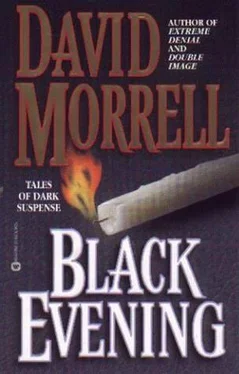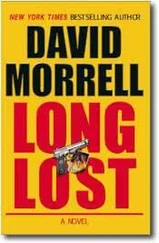David Morrell - Black Evening
Здесь есть возможность читать онлайн «David Morrell - Black Evening» весь текст электронной книги совершенно бесплатно (целиком полную версию без сокращений). В некоторых случаях можно слушать аудио, скачать через торрент в формате fb2 и присутствует краткое содержание. Жанр: Ужасы и Мистика, на английском языке. Описание произведения, (предисловие) а так же отзывы посетителей доступны на портале библиотеки ЛибКат.
- Название:Black Evening
- Автор:
- Жанр:
- Год:неизвестен
- ISBN:нет данных
- Рейтинг книги:4 / 5. Голосов: 1
-
Избранное:Добавить в избранное
- Отзывы:
-
Ваша оценка:
- 80
- 1
- 2
- 3
- 4
- 5
Black Evening: краткое содержание, описание и аннотация
Предлагаем к чтению аннотацию, описание, краткое содержание или предисловие (зависит от того, что написал сам автор книги «Black Evening»). Если вы не нашли необходимую информацию о книге — напишите в комментариях, мы постараемся отыскать её.
Black Evening — читать онлайн бесплатно полную книгу (весь текст) целиком
Ниже представлен текст книги, разбитый по страницам. Система сохранения места последней прочитанной страницы, позволяет с удобством читать онлайн бесплатно книгу «Black Evening», без необходимости каждый раз заново искать на чём Вы остановились. Поставьте закладку, и сможете в любой момент перейти на страницу, на которой закончили чтение.
Интервал:
Закладка:
Go with them. Don't make your friend's mistake.
Don't as you said he said, "immerse" yourself.
Don't let beauty give you pain.
I meant to leave. I truly believe that. I phoned the front desk and asked the concierge to send up some boxes. After I showered and shaved, I went to Myers's room, where I finished stacking the prints. I made another stack of books and another of clothes. I packed everything into the boxes and looked around to make sure I hadn't forgotten anything.
The two canvases that Myers had painted still leaned against a corner. I decided not to take them. No one needed to be reminded of the delusions that had overcome him.
All that remained was to seal the boxes, to address and mail them. But as I started to close the flap on a box, I saw the notebooks inside.
So much suffering, I thought. So much waste.
Once more I leafed through a notebook. Various passages caught my eye. Van Dorn's discouragement about his failed career. His reasons for leaving Paris to come to La Verge – the stifling, backbiting artists' community, the snobbish critics and their sneering responses to his early efforts. Need to free myself of convention. Need to void myself of aesthete politics, to shit it out of me. To find what's never been painted. To feel instead of being told what to feel. To see instead of imitating what others have seen .
I knew from the biographies how impoverished Van Dorn's ambition had made him. In Paris, he'd literally eaten slops thrown into alleys behind restaurants. He'd been able to afford his quest to La Verge only because a successful but very conventional (and now ridiculed) painter friend had loaned him a small sum of money. Eager to conserve his endowment, Van Dorn had walked all the way from Paris to the south of France.
In those days, you have to remember, this valley was an unfashionable area of hills, rocks, farms, and villages. Limping into La Verge, Van Dorn must have been a pathetic sight. He'd chosen this provincial town precisely because it was unconventional, because it offered mundane scenes so in contrast with the salons of Paris that no other artist would dare to paint them.
Need to create what's never been imagined , he'd written. For six despairing months, he tried and failed. He finally quit in self-doubt, then suddenly reversed himself and, in a year of unbelievably brilliant productivity, gave the world thirty-eight masterpieces. At the time, of course, he couldn't trade any canvas for a meal. But the world knows better now.
He must have painted in a frenzy. His suddenly found energy must have been enormous. To me, a would-be artist with technical facility but only conventional eyes, he achieved the ultimate. Despite his suffering, I envied him. When I compared my maudlin, Wyeth-like depictions of Iowa landscapes to Van Dorn's trendsetting genius, I despaired. The task awaiting me back in the States was to imitate beer cans and deodorant packages for magazine ads.
I continued flipping through the notebook, tracing the course of Van Dorn's despair and epiphany. His victory had a price, to be sure. Insanity. Self-blinding. Suicide. But I had to wonder if perhaps, as he died, he'd have chosen to reverse his life if he'd been able. He must have known how remarkable, how truly astonishing, his work had become.
Or perhaps he didn't. The last canvas he'd painted before stabbing his eyes had been of himself. A lean-faced, brooding man with short, thinning hair, sunken features, pallid skin, and a scraggly beard. The famous portrait reminded me of how I always thought Christ would have looked just before he was crucified. All that was missing was the crown of thorns. But Van Dorn had a different crown of thorns. Not around but within him. Disguised among his scraggly beard and sunken features, the tiny, gaping mouths and writhing bodies told it all. His suddenly acquired vision had stung him too much.
As I read the notebook, again distressed by Myers's effort to reproduce Van Dorn's agonized words and handwriting exactly, I reached the section where Van Dorn described his epiphany: La Verge ! I walked! I saw! I feel! Canvas! Paint! Creation and damnation !
After that cryptic passage, the notebook – and Van Dorn's diary – became totally incoherent. Except for the persistent refrain of severe and increasing headaches.
I was waiting outside the clinic when Clarisse arrived to start her shift at three o'clock. The sun was brilliant, glinting off her eyes. She wore a burgundy skirt and a turquoise blouse. Mentally I stroked their cottony texture.
When she saw me, her footsteps faltered. Forcing a smile, she approached.
"You came to say goodbye?" She sounded hopeful.
"No. To ask you some questions."
Her smile disintegrated. "I mustn't be late for work."
"This'll take just a minute. My French vocabulary needs improvement. I didn't bring a dictionary. The name of this village. La Verge. What does it mean?"
She hunched her shoulders as if to say the question was unimportant. "It's not very colorful. The literal translation is 'the stick.'"
"That's all?"
She reacted to my frown. "There are rough equivalents. 'The branch.' 'The switch.' A willow, for example that a father might use to discipline a child." She looked uncomfortable. "It can also be a slang term for penis."
"And it doesn't mean anything else?"
"Indirectly. The synonyms keep getting farther from the literal sense. A wand, perhaps. Or a rod. The kind of forked stick that people who claim they can find water hold ahead of them when they walk across a field. The stick is supposed to bend down if there's water."
"We call it a divining rod. My father once told me he'd seen a man who could actually make one work. I always suspected the man just tilted the stick with his hands. Do you suppose this village got its name because long ago someone found water here with a divining rod?"
"Why would anyone have bothered when these hills have so many streams and springs? What makes you interested in the name?"
"Something I read in Van Dorn's diary. The village's name excited him for some reason."
"But anything could have excited him. He was insane."
"Eccentric. But he didn't become insane until after that passage in his diary."
"You mean, his symptoms didn't show themselves until after that. You're not a psychiatrist."
I had to agree.
"Again, I'm afraid I'll seem rude. I really must go to work." Clarisse hesitated. "Last night…"
"Was exactly what you described in the note. A gesture of sympathy. An attempt to ease my grief. You didn't mean it to be the start of anything."
"Please do what I asked. Please leave. Don't destroy yourself like the others."
"Others?"
"Like your friend."
"No, you said, 'others.'" My words were rushed. "Clarisse, tell me."
She glanced up, squinting as if she'd been cornered. "After your friend stabbed out his eyes, I heard talk around the village. Older people. It could be merely gossip that became exaggerated with the passage of time."
"What did they say?"
She squinted harder. "Twenty years ago, a man came here to do research on Van Dorn. He stayed three months and had a breakdown."
"He stabbed out his eyes?"
"Rumors drifted back that he blinded himself in a mental hospital in England. Ten years before, another man came. He jabbed scissors through an eye, all the way into his brain."
I stared, unable to control the spasms that racked my shoulder blades. "What the hell is going on?"
I asked around the village. No one would talk to me. At the hotel, the manager told me he'd decided to stop renting Van Dorn's room. I had to remove Myers's belongings at once.
Читать дальшеИнтервал:
Закладка:
Похожие книги на «Black Evening»
Представляем Вашему вниманию похожие книги на «Black Evening» списком для выбора. Мы отобрали схожую по названию и смыслу литературу в надежде предоставить читателям больше вариантов отыскать новые, интересные, ещё непрочитанные произведения.
Обсуждение, отзывы о книге «Black Evening» и просто собственные мнения читателей. Оставьте ваши комментарии, напишите, что Вы думаете о произведении, его смысле или главных героях. Укажите что конкретно понравилось, а что нет, и почему Вы так считаете.












